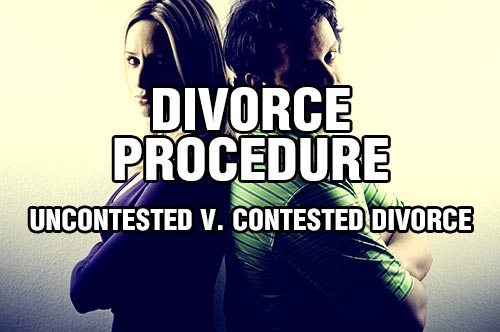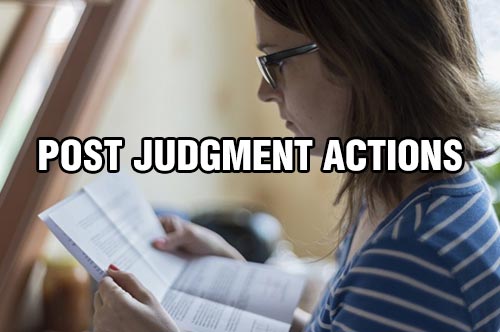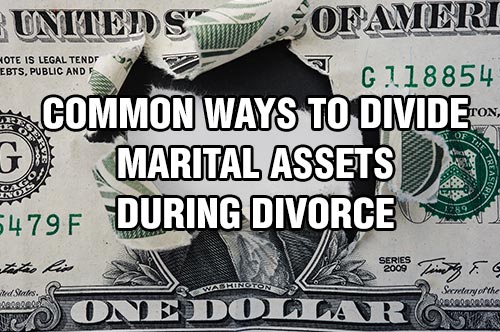A divorce is either contested or uncontested. The process for each is basically the same, although more drawn out in a contested divorce case. There are a few procedural things that will happen in any divorce.
- You or your spouse will file the divorce documents with the court. In some states, you are allowed to file a joint petition.
- You will serve your spouse with the divorce papers. Whoever serves the documents will then provide proof of service to the court, or your spouse can sign a waiver of service. The waiver says he or she has seen the divorce petition but doesn’t need to be formally served. The summons is usually not required if you file a joint petition for divorce.
- Your spouse can file a response, agreeing to everything in the divorce petition or, if the case is contested, arguing certain claims.
Contested divorce definition
What does contested divorce mean?
A contested divorce is one in which the parties cannot agree, either about getting divorced or about the terms of the divorce, such as the division of assets, allocation of debts, alimony, child support, or the custody of children.
At this point lawyers might become involved, if it is a contested divorce. Lawyers will perform discovery. This means possibly subpoenaing your spouse for bank statements, tax returns, and other financial records; interviewing your friends, co-workers, possibly even your children and their coaches, teachers, and child care providers.
What happens in a contested divorce? In adversarial litigation, each spouse’s attorney will try to use anything negative about the opposing spouse as a negotiating chip. There will probably be custody evaluations and your children may have to talk to a psychologist. The reasons for the divorce will most likely come up. Everything about your past – all your dirty laundry – will be dug up and possibly used against you.
The contested divorce cost
This is why most people try to settle the case before it reaches trial. Not only is a big legal battle very costly – legal bills could easily run into the tens of thousands – but it’s also very emotionally draining. However, even if you don’t agree with your spouse on every aspect of your divorce, that doesn’t mean you have to enter into battle. If you do use a lawyer who knows how to contest a divorce, you can still try to retain control.
Most people try to find a cheap contested divorce lawyers. Try to find someone who you feel comfortable with, and don’t pick a warrior unless you want a war – and everything that comes with it. You can also try mediation, with or without a lawyer. In this case, a trained third party will sit between the two of you and help you reach your own marital settlement.
Regardless of what method you use, there might be some issues you can’t seem to reach agreement on. Talking through lawyers might be okay if you feel intimidated by your spouse. But if you have children, you and your spouse will often have to communicate after your divorce. So learning to do this now will put you and your kids at an advantage. Here are some tips on how to negotiate with your spouse.
- If your case is still contested, the next step would be to go to trial. Sometimes you might have to wait up to a year or more for a trial date. When it does come, your attorney will have prepared you to testify and explained basically what will happen.
Representing yourself in a contested divorce
We would never recommend trying to represent yourself in a highly contested divorce without attorney. If you can’t agree with your spouse, you put yourself entirely in the hands of the court, who has a lot of discretion on what they can do. The judge will hear the case and make decisions based on what the statutes require. And based on knowing you for only a couple of hours (seeing most likely the worst sides of each of you). Many people end up being disappointed with the judgment.
There is an famous quote, “he who represents himself in court, has a fool for a client”.
Some people have it in their heads that they will awe the judge with stories of how terrible their spouse is. And how unfairly they were treated during the marriage. You might think the judge will look to punish your spouse, but rarely does this happen. A judge sees this type of thing on a regular basis, and what may seem unbelievable to you is common place to them. Even if you were treated horribly during the marriage, the judge is usually not interested in hearing you badmouth your spouse.
What happens if a divorce is contested
In fact, fault is rarely considered and even when it is, there are often many other factors that will receive more consideration. A judge will hardly ever award everything to one spouse. Of course, this is something that would be best discussed between you and your attorney, if it has to come down to that. The factors in your case may be different.
- Once an agreement is reached, the final divorce documents will be drawn up. You might incorporate a marital settlement agreement into your final divorce decree, depending upon the laws of your state.
- Finally, the divorce papers are signed and filed. A hearing may or may not be required, depending on your case. When you receive a final copy of your divorce decree, your divorce is final.
- After the divorce, you need to follow what your divorce settlement agreement says. You will need to transfer any deeds or property, refinance the house if necessary, close any joint accounts you agreed to doing, and pay your spousal and child support. If you change your name or address, you’ll need to notify everyone who’ll need the update – the DMV, creditors, your social security card (for a name change).
Uncontested divorce definition
What does uncontested divorce mean?
In an uncontested divorce, the spouses agree on everything. They do not need the court to divide assets or make determinations about spousal or child support or custody. In general, an uncontested divorce will proceed through the system more quickly, be much less complicated, and less of a financial burden.
As you can see, contested divorces are much more complicated. An uncontested divorce will generally move through the court system much quicker than a contested case. About 90% of cases are settled without a trial. Some of those people may be able to negotiate a settlement right away – especially if you don’t have many assets.
In those cases, a paralegal service can be a good solution for you. You don’t have to pay for an attorney’s legal advice if you don’t need it, and you know the uncontested divorce papers will be prepared correctly. While you can prepare the papers yourself to file uncontested divorce, many people find this even more frustrating than preparing your own tax return. Even if you can’t agree right away, through limited use of attorney(s) and/or mediator(s), you may be able to come up with a settlement.

Contested Vs Uncontested Divorce Ohio
There are numerous issues that need to be addressed when a couple goes through a divorce. Some issues are agreed upon by the parties prior to even filing for divorce, and some issues require litigation and court intervention in order for them to be decided equitably.
Your ability to reach agreement on these issues will determine if your divorce is a contested divorce or an uncontested divorce. Some of these major issues involved in divorce are as follows:
- Child custody
- Child support
- Spousal support
- Real Estate
- Tax implications
- Personal items
These are but a few of the issues that need to be decided before the court can grant you a divorce and you can move on with your life. When filing for divorce in Ohio, there are two different ways the court can ultimately grant your divorce: A contested or uncontested divorce.
Uncontested Divorce Ohio
 Ohio Civil Rule 55 governs the law in Ohio as it pertains to default judgments. However, Civil Rule 75, which addresses domestic relations issues in Ohio, specifically states in Civil Rule 75(F) “the provisions of Civil Rule 55 shall not apply in actions for divorce, annulment, legal separation or civil protection orders.” What this means is even if a person is served with a Complaint for Divorce, he or she can still participate in the litigation even if he or she does not formally respond to the Complaint. However, if the litigant is served with a Complaint and is provided a notice of hearing and the litigant fails to appear for the hearing, the Court, in its discretion, can proceed on the merits without the other litigant being present for the trial.
Ohio Civil Rule 55 governs the law in Ohio as it pertains to default judgments. However, Civil Rule 75, which addresses domestic relations issues in Ohio, specifically states in Civil Rule 75(F) “the provisions of Civil Rule 55 shall not apply in actions for divorce, annulment, legal separation or civil protection orders.” What this means is even if a person is served with a Complaint for Divorce, he or she can still participate in the litigation even if he or she does not formally respond to the Complaint. However, if the litigant is served with a Complaint and is provided a notice of hearing and the litigant fails to appear for the hearing, the Court, in its discretion, can proceed on the merits without the other litigant being present for the trial.
Not filing an answer and not being able to contest a divorce can have severe and costly implications. For example, the spouse in default may be ordered by the court to pay more money in spousal and/or child support, take on a larger portion of the martial debt, or lose custody of children because the court was unable to hear “your side of the story”. If you received a complaint for divorce, it is highly recommended that you contact an experienced divorce attorney immediately before the time to file an answer expires. The first concern of the attorney is when you received the complaint and how much time you have remaining to file an answer to a divorce to ensure your interests are properly protected. If for some reason the date has passed for you to file an answer to the divorce complaint, an attorney understands the proper procedure to correct the oversight and ensure that your interests remain protected.
Another type of uncontested divorce occurs when a divorce is filed and the parties eventually agree on every aspect of their property, income, assets, liabilities, and child custody. In this situation, the parties will inform the court that they have reached an agreement on all possible issues. The court will then set an uncontested hearing date to enter the agreement onto the record and inquire of the parties as to their understanding of the agreement and whether or not the agreement is fair and equitable and in the best interests of the children (if children are involved). This is very similar to a dissolution, except it is done after a contested divorce is filed and is not under similar Ohio time constraints for a dissolution. This approach is preferred over a default uncontested divorce and a contested divorce because both parties have input on how the marriage should be wound up, instead of just one party or the court, who has no vested interest in the marriage, making the decisions.
Contested Divorce Ohio
 A contested divorce is the typical nasty and costly divorce you often times hear about and associate with the divorce process. This occurs when one spouse files a complaint for divorce and the other spouse, after receiving service of summons, files an answer and possibly a counterclaim, which requires an answer from the plaintiff or filing spouse. This type of divorce is considered a contested divorce until all issues are settled and the court sets an uncontested hearing date as mentioned above.
A contested divorce is the typical nasty and costly divorce you often times hear about and associate with the divorce process. This occurs when one spouse files a complaint for divorce and the other spouse, after receiving service of summons, files an answer and possibly a counterclaim, which requires an answer from the plaintiff or filing spouse. This type of divorce is considered a contested divorce until all issues are settled and the court sets an uncontested hearing date as mentioned above.
During the contested divorce, both sides will engage in what is know as discovery to try to give their side the best possible outcome. During discovery, it is very likely that you will be required to answer interrogatories and submit certain documents requested by your spouse, be examined by your spouse’s attorney in what is know as a deposition, make several court appearances at pre-trail and motion hearings, and other various acts such as house appraisals; physical and mental examinations; and interviews by a Guardian ad litem if children are involved.
The reason many divorces end up being contested is simply that both sides disagree on a crucial aspect of property division and believe that their client is entitled to more than what the other side is offering. Ultimately, if you cannot reach an agreement in your contested divorce the judge will hear all evidence on the contested issues at trial which could range from 1-2 hours to 2 weeks depending on the complexity of the issues. An experienced divorce attorney will be able to determine whether your claims are worth the time and expense of a contested divorce and can counsel you to make the proper decisions in the midst of a nasty, contested divorce.
The bottomline
The difference between a contested and an uncontested divorce may seem very straightforward on paper, but the reality is that making this decision is no easy task. The divorce process is extremely overwhelming physically, emotionally, and financially. It is always a good idea to let an attorney take the additional burden of procedural and substantive decision-making off of your shoulders.









